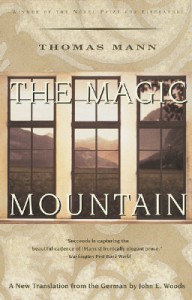
I finally finished the Magic Mountain on 29th December 2014, having started it some time in January of that year, expecting it to take a month or two at most. In fact, towards the last few chapters I looked again at the piece of card I was using as a bookmark, that had become such a constant fixture of my life through the course of the year, but which I had stopped seeing. It was a Happy New Year postcard from the bank with which I had a three-year loan, taken out to buy a new roof for my house and which was causing a certain amount of financial strain. During the course of 2014 I re-mortgaged for a better rate and in doing so wrapped the remains of the roof loan in, effectively wiping out the extra monthly cost, which had another two years to run, but tying the debt to myself for a full 35 years.
What this has to do with Hans Castorp's stay at the Berghof is maybe overly stretched. Hans Castorp, who meant to stay for three conflicted, difficult weeks but stays instead for seven effortless years. Hans Castorp who is always in service to someone, or some cause, other than himself despite the certain selfishness of his position.
I think it is good, possibly it could have only happened this way, that I read The Magic Mountain in my thirties. I spent the majority of my twenties making boring but essential decisions; chasing promotions (and an exit) at minimum wage jobs, studying for professional qualifications to secure the job I escaped to, scaling back writing to have time to sleep to keep those jobs I had. All the kind of boring stuff that Hans Castorp eschews throughout his twenties in the service of the cure. I think that, even had I had the time to read a book such as this in those years I would have hated its subject rather than just looked upon him and his youth (which is hardly yet very distant from my own age now) fondly or understood him in his role as part of Mann's satire.
I do think it must be nice to be able to decide to dedicate yourself to your passions, even, especially, as you can ascribe that decision to forces beyond your control.
I read The Magic Mountain, as I do most of the classics that I read, because it was referenced in something else that I loved and enjoyed. In this case, the referencing work was Michael Crumey's Möbius Dick, a wonderful, strange science fiction novel that is one of my favourite books I've ever read. Möbius Dick also went some way toward convincing me to finally read Moby Dick, which I had had on my reading list for a while as it was. Reading Moby Dick was important for me, reconciling and centring my love and fascination with a sea that I know will eventually kill me. I have since, after many years, even been able to swim in the sea. I am at peace with it and it is at peace with me and the two of us regard each other in the sure knowledge that our time to be together forever is not yet due.
The sea is the opposite of a magical space. It does not release you, changed, once it has its hold of you. Reading The Magic Mountain I have finally understood and processed a number of ideas that I have been working with for a number of years; about asylums, sanitaria and hotels as magical spaces, but also about youth, and games and art as magical spaces. It was also in 2014 that the blogger who had really delineated the concept of magical spaces in occult and literary theory and history revealed himself to be, via the profoundly prosaic space of Tumblr, rather a nasty piece of work. (In an interesting side note, the best ever rejection letter I got was from the short lived, and at the time recently defunct, horror magazine Nasty Piece of Work.) Tumblr is a place that brings out the truth of people, profoundly unable to change them and uninterested in confinement and gestation of ideas where there can instead be a spread of degrading information spurred on by showboating and playing to the crowd.
I didn't only read The Magic Mountain this year. I paused occasionally, rereading amongst other things Murakami's Dance Dance Dance, a novel about the hotel as a magical space. I also read some trashy sci-fi and a bit of Goffman and Foucault talking about institutions. Because I wasn't thinking about institutions enough. I also recorded a podcast about asylums and wrote a few articles about asylums and edited an ezine about religion in games where I pushed an agenda (or 'wrote an editorial linking all the pieces together as if they had been planned that way', if you want to know the trade secret/official line of these things) of games as magical spaces. The Magic Mountain has been a huge part of me this year. It is not maybe for me, as the cover quote proclaims, 'a new way of seeing', but it has certainly, as with the best of magical spaces, provided a space within which sight and thought have been able to alchemically transform and to emerge stronger, richer and of greater value.









